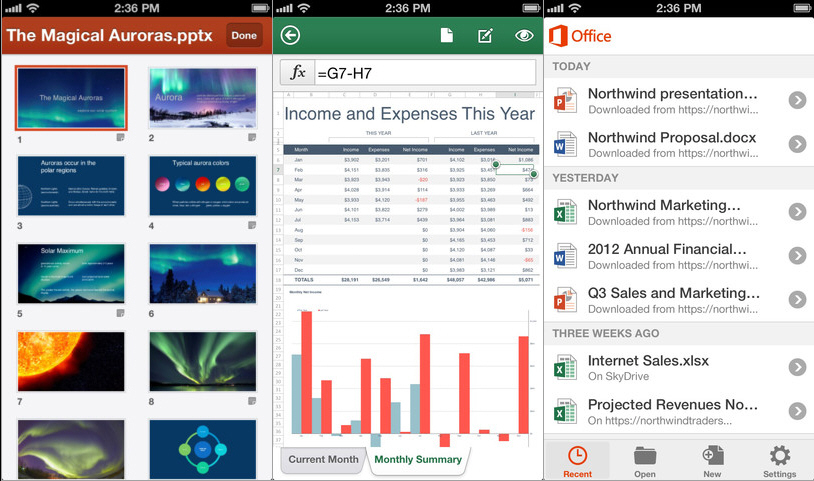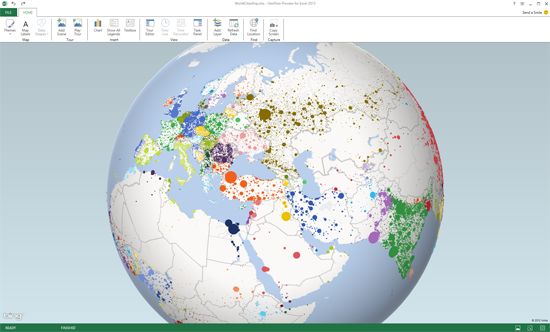
Steve Ballmer's hits and misses from Build 2013 keynote
Perpetual release cycles. Windows 8.1. The unified Windows ecosystem. If there are any key takeaways to remember from Microsoft's cornerstone keynote at the Build 2013 conference, these three items would sum it up quite well. Microsoft CEO Steve Ballmer reminded thousands of developers on stage last week that the company isn't getting left in the dust and it has a solid plan going forward.
While most of the tech world was keenly focused solely on Build 2013 as the gateway to the first official peek at Windows 8.1, Ballmer's keynote had a few other important messages to deliver. The Windows update, formerly known as "Blue", may have stole the show but Microsoft had a grander agenda to piggyback at the developer conference.

Office Web Apps to get Google Docs style real time co-authoring 'very soon'
If you're an avid SkyDrive or Office 365 user who happens to leverage Office Web Apps, Microsoft let loose information on a round of updates that will be hitting the browser based suite quite "soon" according to an official Office 365 blog video.
The posting was part of Microsoft's informal "Garage Series" set of video-blogs aimed at IT professionals who support Office. I happened to stumble upon this week-old entry and was quite surprised at what Microsoft has in store -- namely, hitting Google Docs where Office Web Apps haven't been able to thus far: rich real time co-authoring and collaboration.

All mobile apps should require a subscription like Microsoft Office for iPhone
A couple of days ago, Microsoft quietly launched Office for iPhone. To the ire of many, it requires an Office 365 subscription. The internet is abuzz with chatter that this is simply a way to gain 365 subscriptions. While I do agree this is a way to increase subscriber numbers, it is not the full picture -- it is also the best way to fight piracy. This is the future of mobile app purchasing.
I applaud Microsoft for taking this approach. On iOS, piracy is far too convenient on a jailbroken device, thanks to apps that help the user download them. On Android, a phone does not even need root to install pirated .apk files. And so, how could Microsoft release its flagship software potentially for free for jailbroken iOS users and all Android users? Microsoft Office is too important to show up as an .apk for free in a Google (or Bing) search.

Microsoft: Want Office for iPad? You can't have it, but use Web Apps instead
Yesterday, despite "credible" rumors suggesting a full-on iOS approach, Microsoft released Office for iPhone but left iPad users stranded. The company also planted a little trojan horse -- the app is free but it is not free to use, requiring an Office 365 subscription, which runs for $99.99 per year, to take advantage of Excel, PowerPoint and Word.
But, based on my own experience with Office on Windows Phone, the suite is not really in its own element on a small display. iPhone users are most likely to run the app just to perform quick edits and (in the most-optimistic scenario) create very short and basic documents, presentations or spreadsheets. Office would really shine on bigger screens, however Microsoft doesn't want iPad users to actually use it. I've asked the software giant to explain the iPhone-only design and here is the company's response.

Hands on with Office Mobile for Office 365 Subscribers
As you’ll know by now, Microsoft today announced the launch of Office Mobile for Office 365, an iOS app which allows users to access, view and edit Word, Excel and PowerPoint documents -- provided you have an Office 365 subscription.
We took it for a spin and despite the limitations, were actually pleasantly surprised. There’s plenty of functionality in the app to explore. The app can view Office documents stored on SkyDrive, SkyDrive Pro, or SharePoint, for instance, as well as documents which arrive as email attachments. It syncs with your other Office 365 devices, too, so documents you’ve read elsewhere will appear on your phone’s Recent Documents panel, and when you open one it’ll resume at whatever point you left off.

Microsoft shouldn't do Office for Android
Seven months ago, when rumors burned hot, I explained why "Microsoft Office for Android and iOS is a Trojan Horse" -- that any mobile suite would be all about the cloud service. Sure enough, today Microsoft released the strangely named "Office Mobile for Office 365 Subscribers" to the App Store.
Office 365 is the productivity suite's future. Microsoft now claims to be a "devices and services" company. Smartphones are devices, Office 365 is a service and required for the iOS app. What more reasoning is needed? The Redmond, Wash.-based company provides more functionality than I predicted, but does so strictly in mobile context that doesn't diminish the PC product. That said, what Microsoft gives to iOS should be withheld from Android.

Office finally arrives on iOS, but with limitations
The much talked about iOS version of Microsoft Office finally arrives in the App Store today. While that sounds like great news for anyone hoping to at last be able to (officially) use Word, Excel or PowerPoint on the iPad, you may wish to curb your enthusiasm, as there are some serious limitations with this release.
It's only available in the US for starters (coming to other territories "soon"), and you need to be an Office 365 subscriber to use it. Also it's only optimized for the small screen.

Shock survey: 37% of orgs plan to adopt Office 365 within 24 Months
The war for the hearts and minds of potential cloud email users at organizations worldwide is far from over. Both Microsoft and Google are winning small field skirmishes for their respective corners over the past few years. Most recently, Microsoft won huge contracts with the State of Texas and the City of Chicago moving to Office 365's vision for the cloud. Conversely, Google Apps chalked up big converts in the form of CBC Radio Canada and the US National Archives.
UK business technology website Computing.co.uk has published the results of a survey it ran across 160 IT decision makers from organizations of all shapes and sizes. While the survey sheds light on numerous opinions surrounding the major cloud email platforms, its most shocking finding is that a whopping 37 percent of organizations moving to the cloud for email are opting for Office 365 over all the major players. Other cloud vendors included in the survey results were Google Apps, Apple iWork, and QuickOffice.

Microsoft reorganization is long overdue
Today, over at all AllThingsD, Kara Swisher reports that a major Microsoft makeover is imminent. Reorganization is bloody well overdue, and timing makes sense. The company's fiscal year closes June 30, and the final quarter is when employees, product groups and future plans are evaluated and rewarded and when internal changes occur.
I strongly expect the new structure to mesh with CEO Steve Ballmer's mandate Microsoft is now a "devices and services" company. His larger challenge is surmountable: Enabling a stronger siloed Microsoft that disables a power structure that resembles "A Game of Thrones" -- too many fiefdoms fighting cross-purposes to the kingdom Bill Gates created. Under the current structure, Ballmer deals with only five kingdoms, rather than book and HBO series' seven.

Office 365 for Business: Cloud email (finally) ready for primetime [review]
Merely a half year ago, my thoughts on Office 365 were salty at best. Outages continuously plagued the service. Its treatment of browser-based users who wished to forego desktop versions of Outlook and Office disappointed. And spam filtering was bottom tier, proving to do little in stemming waves of junk mail. In the February 2013 release, Microsoft turned a new page and proved why it's a reliable comeback kid in the cloud.
If you don't believe Microsoft is transorming itself into a company solidly rooted in the cloud, you're clearly missing the writing on the wall. The company's past three years have been nothing short of a cloud-cluster of budding services while simultaneously sun-setting legacy on-premise products. Windows Small Business Server bid its farewell, while runaway hits like Azure sweep the Redmond, Wash. horizon. Yet even as Office 365 for consumers came out to relatively loud fanfare, the main attraction of the Office 365 product line is the business-oriented offerings.

Telefónica provides Microsoft with 130,000 new Office 365 users
While Microsoft continues to attack Google using its "Scroogled" campaign, the company also adds to its corporate user base at a steady, and perhaps increasing, rate. Ironically, less than a week after taking on Google Docs with not one, but two videos, Microsoft adds another major corporation to its Office 365 subscriber list, this time in the form of Telefónica, a major provider of integrated communication solutions.
Telefónica will add 130,000 employees to the Microsoft cloud solution, not only using Office 365, but also Yammer. "Over the past 18 months, we have built very strong foundations and are now ready to move to the cloud," said Adrian Steel, the European production hub lead and global director at Telefónica. Steel goes on to explain "Deploying Office 365 and Yammer is this next step in bringing our global workforce to the forefront of seamless communication and collaboration while still operating at the level of speed and execution we’re known for".

Microsoft's wonky payment system is oh-so last century
I subscribe to Office 365, as it is a great value -- for just under $10 per month I can install Office 2013 on up to five computers and even gain an additional 20GB of SkyDrive storage, taking my total to 45GB, thanks to being grandfathered into the 25GB free plan. The subscription even gives me a bit of free Skype that, perhaps, one day I shall actually use. All of this sounds great -- what more could you want? Well, how about a payment system that has customers in mind?
Over this past weekend, I had occasion to meet with the dysfunctional payment system that Microsoft has implemented. While I use many of the company's products, Office 365 Home Premium is my first occasion making monthly payments to the software giant. I am used to doing so with other services, such as Amazon.

Project GeoFlow gets public preview
Microsoft announced GeoFlow at the SharePoint conference in November 2012 and today rolled out a public preview of the 3-D mashup that combines the Office spreadsheet app Excel with Bing maps to allow you to plot geographic and temporal data visually.
Microsoft Research claims that GeoFlow "enables information workers to discover and share new insights from data through rich, 3-D data on a globe and fluid, cinematic guided tours—virtual cinematography moving through data". The app evolved out of the WorldWide Telescope project. "We built a gigantic virtual telescope, but to do so, we had to build an engine that could visualize the universe. If we can visualize the universe, we can visualize almost anything else", Microsoft Research principal researcher Curtis Wong explains.

Office 365 scores a big win with ABB
Microsoft has been racking up contracts between Office 365 and businesses and governments recently, including eight new ones just announced in March. Now the company may have made its biggest score yet, partnering with world-wide power and productivity company ABB.
According to Andy Tidd, chief information officer at ABB Group, "Office 365 and Yammer will enable us to transform communication and collaboration among our employees, surfacing the best and most innovative ideas across the organization".

Microsoft wins, even if the PC loses
I am simply stunned by the ridiculous number of "Microsoft will be dead in four years" stories, following Gartner's grim PC forecast three days ago. I offered brief analysis then and promised something later, and this is it. Yesterday, colleague Alan Buckingham posted first: "Microsoft is nowhere near death's door" -- and he absolutely is right.
Throw a rock, and you can't miss a doom-and-gloom armchair analysis. Among the many are "Gartner: Microsoft is dead, Windows has expired, Office has ceased to be" (Computerworld); "How long can Microsoft go on like this?" (InfoWorld); "Apple's ultimate victory over Microsoft" (Motley Fool); and "Gartner may be too scared to say it, but the PC is dead" (ReadWrite). For the most part, all these armchair pundits are mistaken. Hugely.
